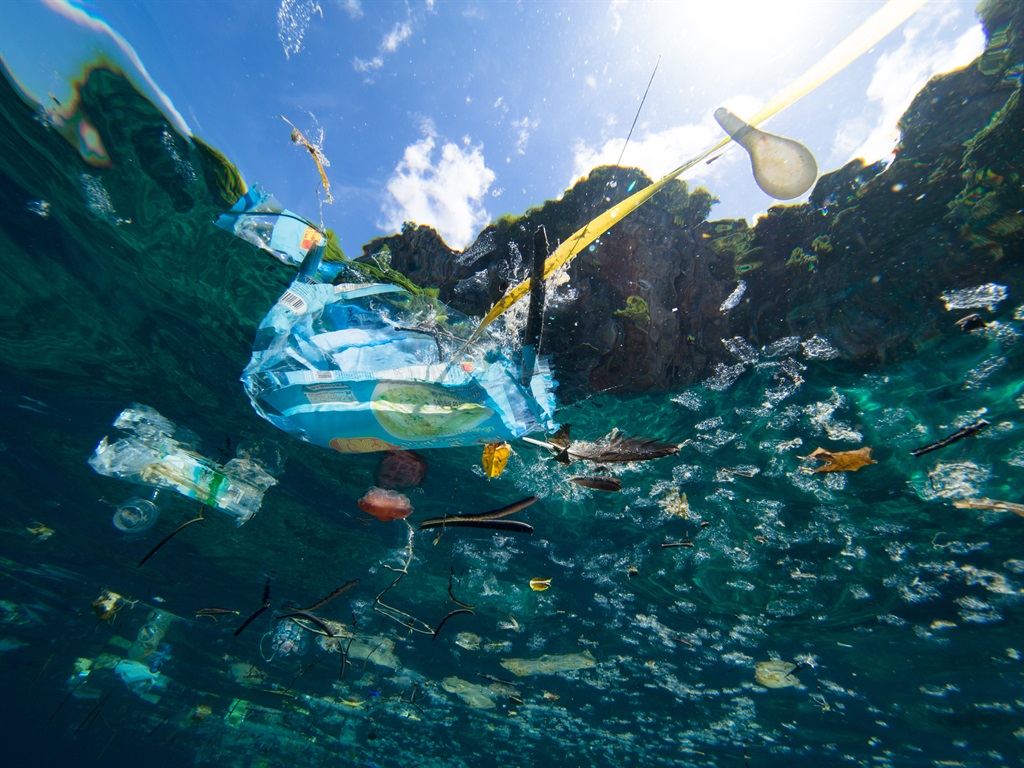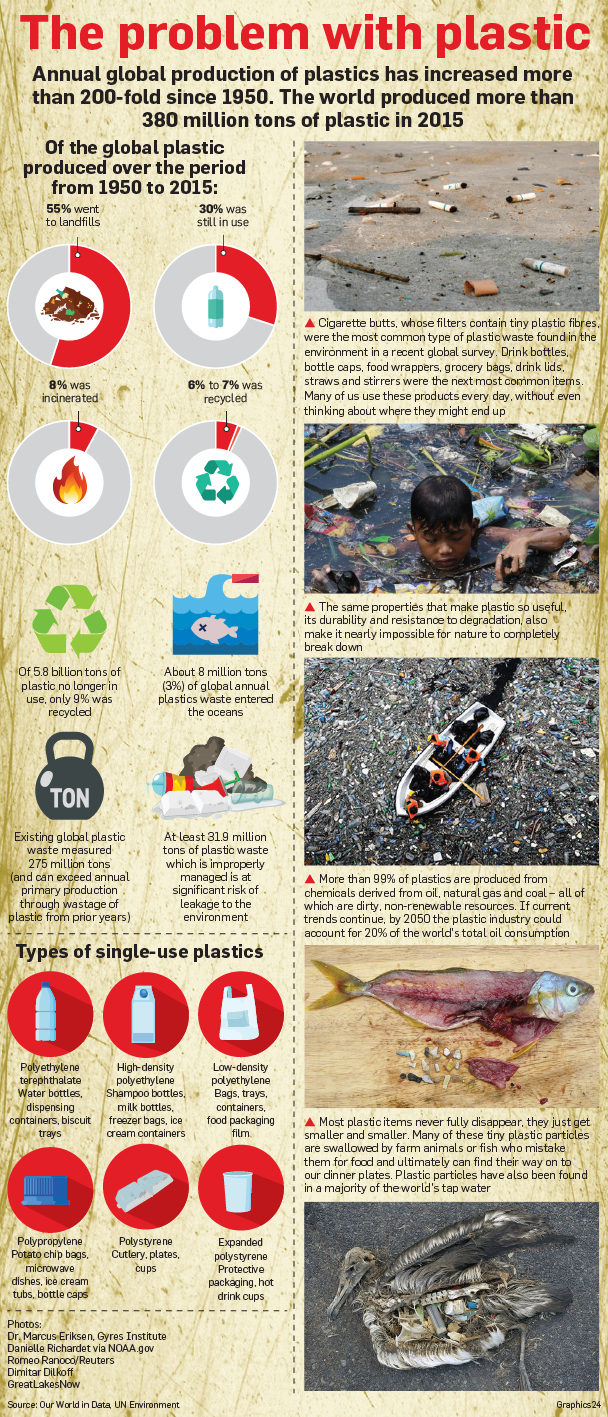
It has infiltrated the air, soil, oceans and even our bodies, but banning plastic waste isn’t the answer; reusing it is.
You have probably seen the pictures: beached whales with masses of plastic debris and trash found in their stomachs; the huge patches of garbage; plastic floating and swirling in the Pacific Ocean; and the heaps of stacked-up plastic bottles and other materials in landfills.
You have probably also seen the responses to the ever-growing plastic pollution crisis. These take the form of suggested options ranging from biodegradable plastic bags to dedicated zones in retail stores that offer plastic-free packaging, to – love them or hate them – paper straws.
Researchers estimate that 300 million tons of plastic waste is produced worldwide annually, with a staggering 8 million tons of it ending up in the world’s oceans.
According to a recent World Economic Forum report, by 2050, there could be more plastic than fish by weight in the ocean.
This begs the following questions: Are countries and individuals, particularly those of us here in South Africa, doing enough to reduce environmental plastic waste and the footprint of single-use plastics?
And when it comes to interventions that have already been effected, are any of these making any real difference in the war against plastic waste?
This week, City Press spoke to retailers actively working to promote plastic-free products and industry leaders in plastic production. They were divided on the issue but agreed on two things: locals have to rethink the way in which they see and use plastic waste, and the country’s waste management infrastructure needs upgrading.
“The truth is, we do not know whether the situation has already too far gone,” said Catherine Morris, director at Green Home, which supplies biodegradable food packaging primarily to the takeaway industry.
“The mass production of plastic started in earnest 70 years ago, but awareness of marine plastic pollution only began in the 1990s – and has only really dominated the public discourse in the past decade.
“We do know that plastic waste has reached the remotest parts of Earth and that microplastics are in our air, water, soil and food web – and in us. There is also the heartbreaking fact that millions of sea mammals and birds are dying as a result of plastic waste. But whether we can turn this around is anyone’s guess,” she said.
For the past few years, in July, not-for-profit organisation the Plastic Free Foundation has led a worldwide campaign to highlight and educate the public about the dangers of plastic waste. Its campaign is called Plastic-Free July.
Last year, the WWF stated that most marine litter is plastic packaging – single-use applications, such as straws and water bottles, that are particularly prone to inappropriate disposal. It said 94% of litter washing up on South Africa’s beaches is made of plastic, of which 77% is packaging.
“Nobody is more disgusted at plastic pollution than those of us who work in the plastics industry,” said Anton Hanekom, executive director of Plastics SA, which represents the plastics industry in the country.
“It is distressing to see our products washed up on beaches and littering the landscape.”
But he described the call to ban plastic products as an “irrational” and “simplistic” response to a complex problem. “We need to rethink how we see plastic waste. It is a valuable resource that can be reused and recycled to make new products.
“Plastics are an integral part of our modern lifestyle; they keep our food fresh and ensure food safety. They also give us safe and tamper-proof medicines, and so much more. The challenge is to prevent plastics from ending up in the environment.”
Janneke Blake agrees. She owns Shop Zero, a store in Cape Town that offers environmentally friendly products with little or zero packaging.
“We need to look at the things that we typically throw away and turn them into things of longevity,” she said.
“For example, there is a professor who is transforming plastic into usable energy and has recycled 50 tons of plastic into fuel. Scientists have also been working on creating sustainable building materials from fungi that can break down plastic. And there are brands whose owners are taking plastics from the ocean and then upcycling and recycling that plastic waste into functional products.”
Blake said the various interventions and products that had been initiated to deal with the global plastic waste crisis were a positive start, but reform was needed at all levels. “It is not just the consumer’s responsibility. Businesses have to come up with more ecofriendly alternatives and governments should do more to protect the environment. We want to see the money from South Africa’s national bag levy spent on creating green jobs and fixing our waste management facilities.”
This week, in a written reply to a parliamentary question submitted by the DA, Environment, Forestry and Fisheries Minister Barbara Creecy said government was considering introducing a new policy to reduce people’s reliance on single-use plastics as well as proper disposal management measures.
Read: But do you really care about the environment?
“The department has initiated a process to review the effectiveness of policies relating to the management of plastic waste and to consider whether it is necessary to have a new policy direction,” Creecy wrote.
Big franchises such as Pick n Pay are also coming to the plastic-free party, albeit gradually.
The supermarket chain announced this week that it would introduce a “plastic and packaging-free” produce zone – taking the form of a “nude” fruit and vegetable produce wall – in 13 select stores. This, as part of a trial to assess whether customers are ready to switch from prepackaged foods to loose produce.
Paper bags will be available to customers at the nude wall to complete their plastic-free, greengrocer-inspired shop.
“The goal is definitely to get rid of all plastic,” said Dominic Moleta, founder of The Refillery, a plastic-free grocery store in Johannesburg.
“Plastic-free living takes lots of planning and effort, but is achievable. Shopping plastic-free in a bulk-food store is the most economical way of shopping. You are able to buy in quantities that you actually want or need that are not prescribed for you. The idea is not to have a handful of people living ‘zero waste-perfect’ lives, but rather, a million people doing it imperfectly,” he added.
So, how can you reduce plastic waste in your home?
Shop Zero’s Blake has this advice: “Start small by taking your own bags to the shops. It is one of the easiest ways to cut down on single-use plastic. Next, refuse takeaway coffee cups and lids, plastic straws and plastic water bottles. Rather sit down to have your coffee, ask for a drink with no straw, and use your lips to sip your drink.
“But,” she adds, “we need to remember people with disabilities, who may not be able to use plastic-free options and would struggle in daily life without straws.”
TALK TO US
Are you part of the ‘reuse, reduce, recycle’ community? Have you found ways to cut down on your use of plastic at home?
SMS us on 35697 using the keyword PLASTIC and tell us what you think. Please include your name and province. SMSes cost R1.50.




 Publications
Publications
 Partners
Partners









